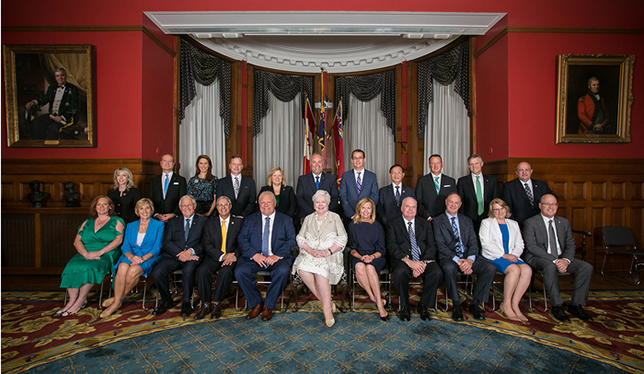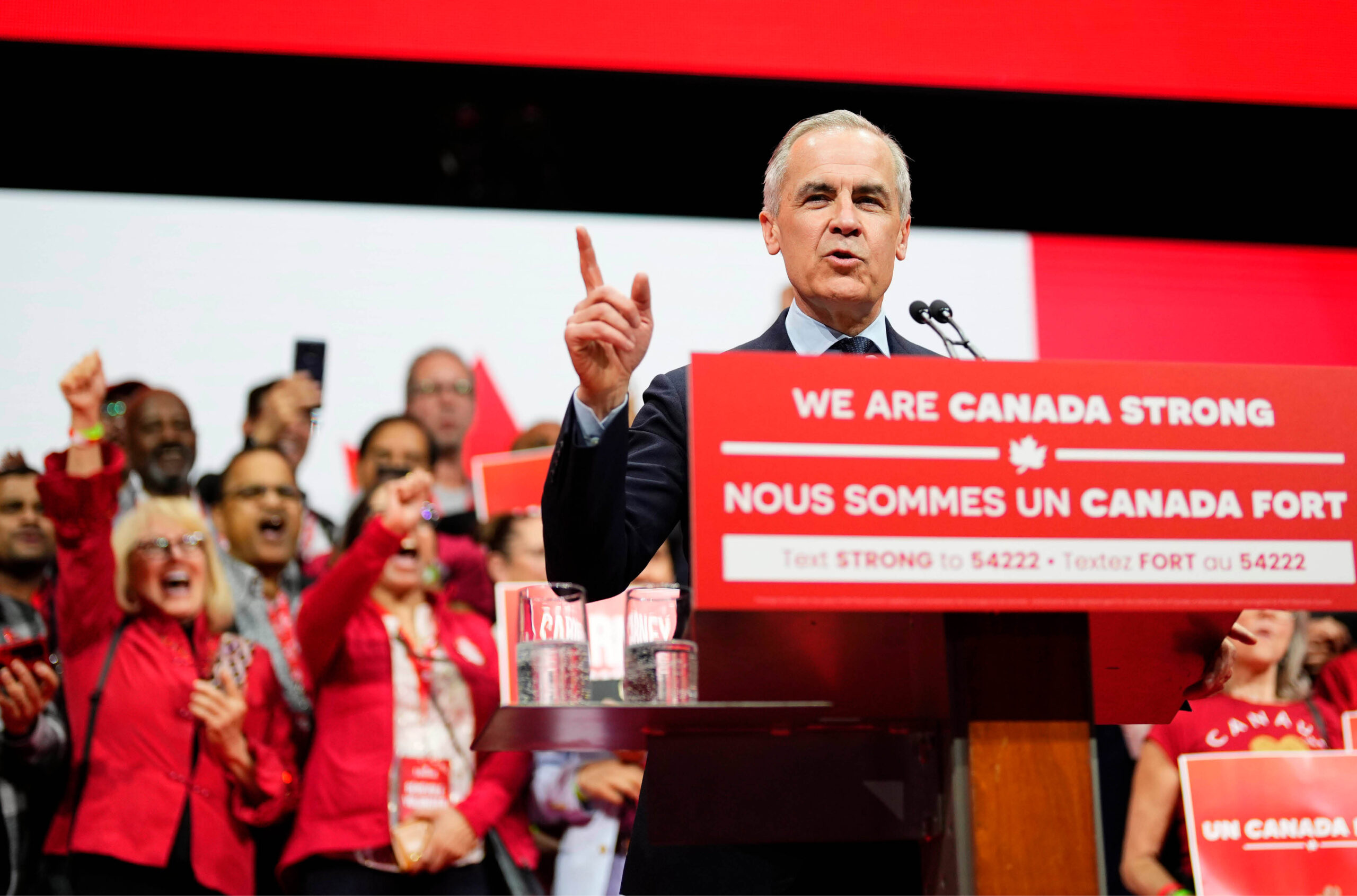Who knows what Doug Ford’s government has in store for higher-ed in Ontario?
With a controversial pick leading the Ministry of Training, Colleges and Universities, don’t hold your breath on big ideas or transformative change for the sector.

Fifty-three years ago, a Progressive Conservative education minister unleashed what is still the most significant transformation of higher education in Ontario. Bill Davis pushed legislation to create the community college system, which diversified the provision of education and training and laid the foundation for the dramatic expansion of postsecondary access that has made Ontario a leader in educational attainment internationally.
Ontario Premier Doug Ford and his cabinet were sworn in on Friday, June 29, and many in the higher education community are wondering what this new government will bring to the sector. Wherever they fall in the political spectrum, however, no one is holding their breath in anticipation of big ideas or transformative change.

If Mr. Ford’s campaign was notoriously short on details in general, all it had to say about higher education in particular concerned “protecting free speech on university campuses.” Claiming that there are “numerous examples of individuals in Ontario being reprimanded for engaging in free speech,” his platform proposes to tie postsecondary funding to a complaints and investigations process run by the Higher Education Quality Council of Ontario (HEQCO). This essentially parrots a similar proposal in Andrew Scheer’s campaign for the leadership of the federal Conservative Party, who in turn imported the idea from the United States, where it has percolated for decades.
In an eyebrow-raising move, Mr. Ford appointed MPP Merrilee Fullerton to lead the re-christened Ministry of Training, Colleges and Universities (MTCU). A family doctor who campaigned on improving health care and supporting high-tech in her Ottawa riding of Kanata—Carleton, among other PC go-tos, Dr. Fullerton gained notoriety this year for controversial tweets criticizing face-covering by Muslim women, making assertions about the dangers posed by second-generation immigrants and sharing a Breitbart News article about an anti-Muslim rally. Further, she has blogged indicating that foreign doctors should be surveilled as a counter-terrorism measure. She was backed by the party and issued no apology for her remarks.
With this recent background, Dr. Fullerton will oversee Mr. Ford’s free speech agenda.
These facts may well be unrelated; MTCU might just have been the right ministry for a new MPP to join the premier’s cabinet as it is not one of the central files in the provincial government. However, the optics are provocative and will likely spark acrimonious debate should Mr. Ford’s notion of protecting free speech gain traction.
Essentially, this agenda is obviously not about higher education, but about taking political advantage of the contemporary culture wars that manifest in campus free speech controversies. Even if one took at face value the party’s interest in free speech, an evidence-based case can hardly be made that freedom of expression is under attack in universities, calling for government to step in. This is a terrain dominated by sensationalism and overgeneralizations, not concern for real problems among the many that students and institutions face.
In the real world, there are plenty of substantive questions that one wishes the new government has put some thought into. How will the province’s university funding model evolve as MTCU has for years worked towards aligning it with outcomes and institutional differentiation? What will postsecondary funding look like as Mr. Ford promises to cut $6 billion in government spending? How will the new Université de l’Ontario français, established by Kathleen Wynne’s government, fare under Doug Ford now that work to get it off the ground has begun?
We have no clue into the answers to these questions, nor whether the new government has a starting position on them to work from. In the current context, the manifest Progressive Conservative agenda on higher education is one of scoring cheap political points by appeasing those who are not familiar with, are alienated from, or have an axe to grind with universities. That is unfortunate not just for universities but for the quality of our public debate about higher education, as we become entangled in diversionary agendas rather than the substantive issues the province needs to address.
Featured Jobs
- Business – Lecturer or Assistant Professor, 2-year term (Strategic Management) McMaster University
- Veterinary Medicine - Faculty Position (Large Animal Internal Medicine) University of Saskatchewan
- Education - (2) Assistant or Associate Professors, Teaching Scholars (Educational Leadership)Western University
- Psychology - Assistant Professor (Speech-Language Pathology)University of Victoria
- Canada Excellence Research Chair in Computational Social Science, AI, and Democracy (Associate or Full Professor)McGill University
















Post a comment
University Affairs moderates all comments according to the following guidelines. If approved, comments generally appear within one business day. We may republish particularly insightful remarks in our print edition or elsewhere.
3 Comments
This entire article could be condensed to the first phrase of the summary paragraph:
“We have no clue”
My wife and I wish to register our opposition to the development of a French-language university in Ontario, specifically for Toronto. Please consider the stated amount as “start-up cost” ($83 million) in the context of current post-secondary education in the province.
• Your government is the second lowest in Canada in percentage funding per capita for post-
secondary education.
• Along with Nova Scotia, this province has the highest reliance on student fees for university revenues
• This is reflected in the average student debt among undergraduates in the last year of their programs, $26,000. in Ontario vs $ 15,000 in Quebec.
• Ontario has the highest, average undergraduate fees in Canada ($7,686.00) (OCUFA Journal of Higher Education)
• More university students must have gainful employment during their academic year (In the 1970s, 25% now 50%) This places added pressure on their academic performance.
• First-year classes, particularly in Social Science, continue to increase in numbers placing pressure on space allocations.
• Faculties within the universities must accommodate budget cuts each year, while hiring among administrators rises.
• The reasons given for the location of the French-language university do not concur with demographic data among the francophone populations of Canada or Ontario
• Sixty-two percent of the Franco-Ontarian population live in regions bordering Quebec. In the Sudbury region, a linguistic bellwether for Northern Ontario, the use of French as the language of the home is declining. (Statistics Canada, August, 2017)
• As a sample of southwestern Ontario, less than 1% of the population of London speak French at home, either alone or in combination with another language. (Statistics Canada, August, 2017)
• Very few people in Toronto speak French. Only 1.1% of the population reported French as their mother tongue, and just 0.5% reported French as the language spoken in the home. (Country Digest.org/Toronto-population/#Toronto_languages)
• Statistics Canada predicts by the census of2036, 26% to 30% of the Canadian population will have a mother-tongue other than French or English. The proportion of the French, mother-tongue population will fall faster than among the Anglophones, down from 21% currently to 17% – 18%.
• For the population whose “first official language spoken” (FOLS) is English could rise from 75.4% (2011) to c.78% in 2036. The French FOLS population is expected to fall from 23% of the Canadian population to less than 21% in 2036. (Statistics Canada, “Language Projections for Canada”, Catalogue # 89-657-X)
• Even in the context of high immigration, where it is normal to see the relative weight of the official languages as a decrease while speakers of a 3rd language occupy more space, the weaker (French) will erode across the country.
The Franco-Ontarian population is well served with choices for post-secondary education even in Toronto with York’s Glendon College, which has been struggling to fill places available according to the local press. For many years governments in Ontario have developed good policies and programs to protect the French language – in elementary and secondary education, in the judiciary, in government services, in signage and elsewhere.
The universities and colleges in Ontario could apply the funds you propose for the French-language university in a more productive manner to improve the quality of teaching, particularly for large classes, and student support. We urge you to rethink your proposal for an institute that is neither needed nor will be well attended.
Sincerely,
Donald Cartwright, PhD 1008 Wellington Street
Professor Emeritus London, ON.
Faculty of Social Science N6A 3T4
University of Western Ontario
London, ON.
3M National Teaching Fellow
If worrying about alleged threats to right-wing provocateurs speaking on college and university campuses was the worst we had to fear from Doug Ford, then I would be happy.
Unfortunately, his far more dangerous agenda concerns the further corporatization of post-secondary education. This includes the commodification of curriculum and pedagogy, the commercialization of research, the threat to authentic academic freedom, the further use of the discount department store “business model” of higher education that turns Associate Professors into the academic equivalent of Walmart Associates.
As Canada beloved “conservative” philosopher George Grant (1918-1988) put it, “the curriculum is the soul of the university.” Alas, we have mortgaged our soul for an autocratic, top-down, STEM-besotted approach that has eviscerated the Humanities and Social Sciences and put the academy at the mercy of the “market mentality.” Selling the “student experience” to “customers” rather than providing high standards for students is now the madness in our methods.
Meanwhile, those college professors who went on strike last Fall for economic equity for their “precarious” colleagues, authentic academic freedom and a desperately needed restructuring of college governance can be forgiven for thinking that the solid steps toward reform will be washed away as the Ford government destroys the faint hope for tonic change.